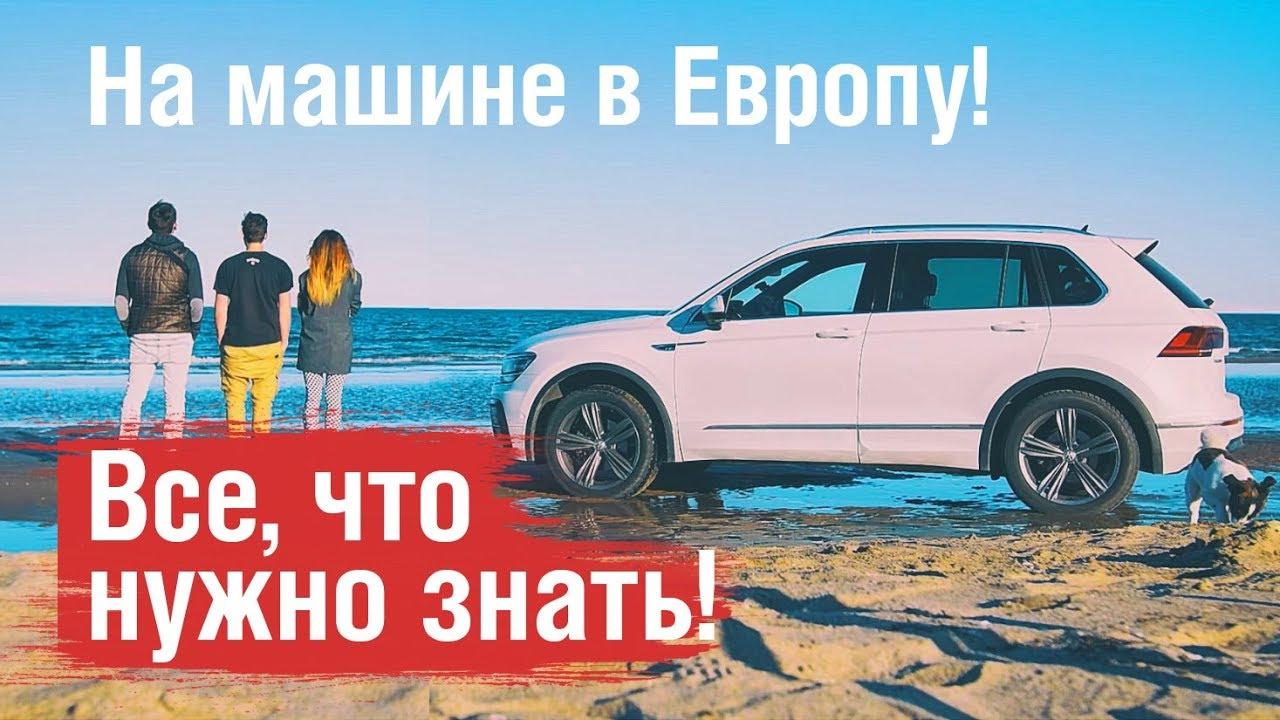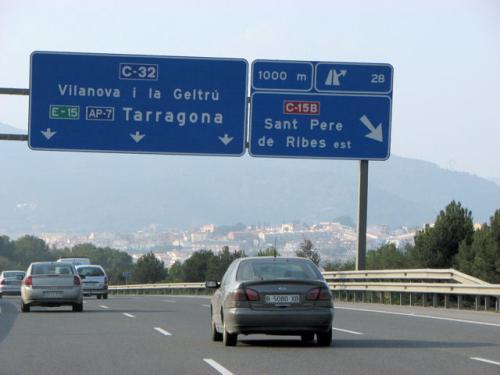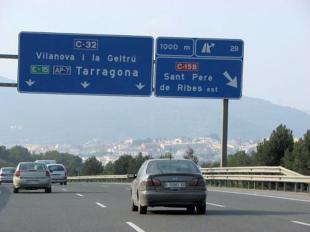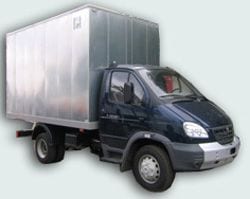
Europe by car
 For those who travel abroad by car, we remind you of the most important traffic rules in other countries.
For those who travel abroad by car, we remind you of the most important traffic rules in other countries.
Most European countries accept driving licenses issued in Poland, with the exception of Albania. In addition, a registration certificate with a current record of technical approval is also required. Drivers must take out third party liability insurance.
In Germany and Austria, the police pay special attention to the technical condition of vehicles. When we go on a trip, we also need to make sure that the car is properly equipped. Warning triangle, first aid kit, spare bulbs, tow rope, jack, wheel wrench are required.
In some countries, such as Slovakia, Austria, Italy, a reflective vest is also required. In the event of a breakdown, the driver and passengers on the road must wear it.
In all European countries, it is strictly forbidden to talk on a mobile phone while driving, except through a hands-free kit. Seat belts are a separate issue. Both drivers and passengers in almost all countries must fasten their seat belts. The exception is Hungary, where rear passengers outside built-up areas are not required to do so. Some countries have imposed restrictions on drivers over the age of 65. They require additional tests, for example in the Czech Republic, or prohibit driving after the age of 75, for example in the UK.
Austria
Speed limit - built-up area 50 km/h, unbuilt 100 km/h, highway 130 km/h.
Persons under the age of 18 cannot drive a motor vehicle, even if they have a driver's license. Tourists traveling by car should take into account a thorough inspection of the technical condition of vehicles (especially important: tires, brakes and first aid kit, warning triangle and reflective vest).
The permissible amount of alcohol in the driver's blood is 0,5 ppm. If we are traveling with children under 12 and under 150 cm tall, please remember that we must have a car seat for them.
Another thing is parking. In the blue zone, i.e. short parking (from 30 minutes to 3 hours), in some cities, for example in Vienna, you need to buy a parking ticket - Parkschein (available at kiosks and gas stations) or use parking meters. In Austria, as in many other European countries, the vignette, i. sticker confirming the payment of tolls on toll roads. Vignettes available at petrol stations
Emergency phone numbers: fire brigade - 122, police - 133, ambulance - 144. It is also worth knowing that last year the obligation to drive at traffic lights was canceled here during the day, in spring and summer.
Włochy
Speed limit – populated area 50 km/h, undeveloped area 90–100 km/h, highway 130 km/h.
The legal blood alcohol level is 0,5 ppm. Every day I have to drive with the low beam on. Children can be transported in the front seat, but only in a special chair.
You have to pay to use motorways. We pay the fee after passing a certain section. Another issue is parking. In the center of large cities during the day it is impossible. Therefore, it is best to leave the car on the outskirts and use public transport. Free seats are marked with white paint, paid seats are marked with blue paint. In most cases you can pay the fee at the parking meter, sometimes you need to buy a parking card. They are available in newspaper stores. We will pay for them on average from 0,5 to 1,55 euros.
Denmark
Speed limit – populated area 50 km/h, undeveloped area 80–90 km/h, highways 110–130 km/h.
Low beam headlights must be on all year round. In Denmark, motorways are not tolled, but instead you have to pay tolls on the longest bridges (Storebaelt, Oresund).
A person who has up to 0,2 ppm of alcohol in the blood is allowed to drive. There are frequent checks, so it's best not to risk it, as the fines can be very severe.
Children under three years old must be transported in special chairs. Between the ages of three and six, they travel with seat belts on a raised seat or in a so-called car harness.
Another issue is parking. If we want to stay in the city, in a place where there are no parking meters, we must place the parking card in a visible place (available from the tourist information office, banks and the police). It is worth knowing that in places where the curbs are painted yellow, you should not leave the car. Also, you do not park where there are signs that say "No Stopping" or "No Parking".
When turning right, be especially careful of oncoming cyclists as they have the right of way. In the event of a minor traffic accident (accident, no casualties), the Danish police do not intervene. Please write down the driver's details: first and last name, home address, vehicle registration number, insurance policy number and insurance company name.
The damaged car must be towed to an authorized service station (linked to the make of the car). The ASO informs the insurance company, whose appraiser evaluates the damage and orders its repair.
France
Speed limit - built-up area 50 km/h, unbuilt 90 km/h, expressways 110 km/h, motorways 130 km/h (110 km/h in rain).
In this country, it is allowed to drive up to 0,5 blood alcohol per million. You can buy alcohol tests in supermarkets. Children under 15 and under 150 cm tall are not allowed to travel in the front seat. Except in a special chair. In spring and summer, it is not necessary to drive during the day with the lights on.
France is one of the few EU countries that has introduced a speed limit during rain. Then on motorways you can not drive faster than 110 km / h. Motorway tolls are collected at the exit of the toll section. Its height is set by the road operator and depends on: type of vehicle, distance traveled and time of day.
In large cities, you should be especially careful with pedestrians. They often miss red light. In addition, drivers often do not follow the basic rules: they do not use the turn signal, they often turn right from the left lane or vice versa. In Paris, right-hand traffic has priority at roundabouts. Outside the capital, vehicles already at the roundabout have priority (see relevant road signs).
In France, you cannot park where curbs are painted yellow or where there is a yellow zigzag line on the pavement. You must pay for the stop. There are parking meters in most cities. If we leave the car in a prohibited place, we must take into account that it will be towed to the police parking lot.
Lithuania
Permissible speed - settlement 50 km/h, undeveloped area 70–90 km/h, highway 110–130 km/h.
When entering the territory of Lithuania, we do not need to have an international driving license or buy local civil liability insurance. Highways are free.
Children under 3 years of age must be transported in special seats fixed in the back seat of the car. The rest, under 12 years old, can travel both in the front seat and in a car seat. The use of dipped beam is relevant all year round.
Winter tires must be used from 10 November to 1 April. Speed limits apply. The permissible blood alcohol content is 0,4 ppm (in the blood of drivers with less than 2 years of experience and drivers of trucks and buses, it is reduced to 0,2 ppm). In the case of repeated drunk driving or without a driver's license, the police may confiscate the vehicle.
If we are involved in a traffic accident, the police should be called immediately. Only after submitting a police report will we receive compensation from the insurance company. Finding a parking space in Lithuania is easy. We'll pay for the parking lot.
Germany
Speed limit - built-up area 50 km/h, non-built-up area 100 km/h, recommended motorway 130 km/h.
Motorways are free. In cities, special attention should be paid to pedestrians and cyclists, who have priority at crossings. Another issue is parking, which, unfortunately, is paid in most cities. The proof of payment is a parking ticket placed behind the windshield. Residential buildings and private lots often have signs saying "Privatgelande" next to them, which means you can't park in the area. In addition, if we leave the car in a place where it will interfere with traffic, we must take into account that it will be towed to the police parking lot. We will pay up to 300 euros for its collection.
In Germany, special attention is paid to the technical condition of the car. If we don't have a technical test other than a high fine, the vehicle will be towed and we will pay a fixed fee for the test. Likewise, when we don't have full paperwork, or when the police discover some major malfunction in our vehicle. Another trap is radar, which is often installed in cities to catch drivers at red lights. When we travel on German roads, we can have up to 0,5 ppm of alcohol in our blood. Children must be transported in child safety seats.
Slovakia
Speed limit - built-up area 50 km/h, unbuilt 90 km/h, highway 130 km/h.
Tolls apply, but only on first class roads. They are marked with a white car on a blue background. A vignette for seven days will cost us: about 5 euros, for a month 10, and an annual 36,5 euros. Failure to comply with this requirement is punishable by a fine. You can buy vignettes at gas stations. Drunk driving is illegal in Slovakia. In case of problems with the car, we can call for roadside assistance on the number 0123. Parking in large cities is paid. Where there are no parking meters, you should buy a parking card. They are available at the newspaper store.
Be especially careful here
Hungarians do not allow alcohol to enter the blood of drivers. Driving with double throttle will result in immediate revocation of your driver's license. Outside the settlement, we are required to turn on the dipped headlights. The driver and front passenger must wear their seat belts, whether they are in built-up areas or not. Rear passengers only in built-up areas. Children under 12 are not allowed to sit in the front seat. We park only in specially designated areas where parking meters are usually installed.
The Czechs have one of the most draconian traffic rules in Europe. Going there on a trip, you should remember that you need to drive all year round with the dipped headlights on. We must also travel with seat belts fastened. In addition, children up to 136 cm tall and weighing up to 36 kg must only be transported in special child seats. Parking in the Czech Republic is paid. It is best to pay the fee at the parking meter. Don't leave your car on the sidewalk. If we are going to Prague, it is better to stay on the outskirts and use public transport.
A fine for a slight excess of the permitted speed will cost us from 500 to 2000 kroons, i.е. about 20 to 70 euros. In the Czech Republic, driving under the influence of alcohol and other intoxicating substances is prohibited. If we are caught in such an offense, we face a prison term of up to 3 years, a fine of 900 to 1800 euros. The same penalty applies if you refuse to take a breathalyzer or take a blood sample.
You have to pay to drive on highways and expressways. You can buy vignettes at gas stations. Lack of a vignette can cost us up to PLN 14.
